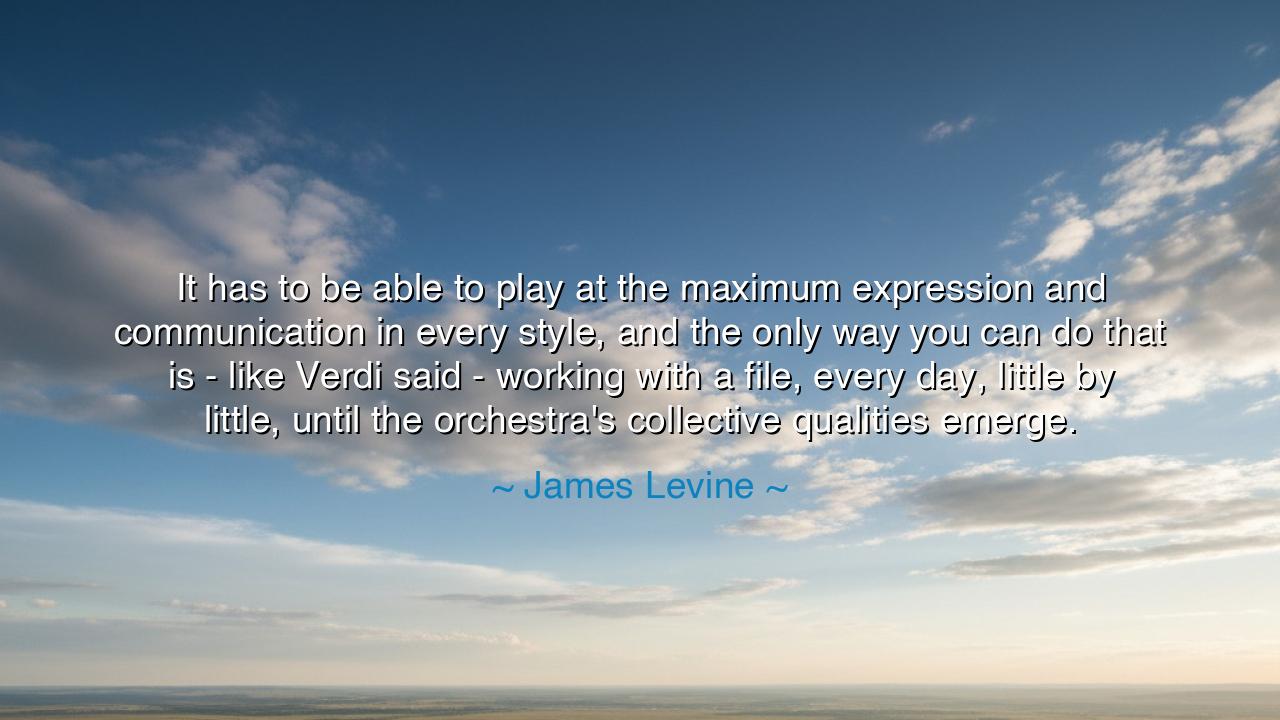
It has to be able to play at the maximum expression and
It has to be able to play at the maximum expression and communication in every style, and the only way you can do that is - like Verdi said - working with a file, every day, little by little, until the orchestra's collective qualities emerge.






Opening Scene
The room is quiet, the soft light from the lamp casting a gentle glow across the table. Jack and Jeeny sit together, their mugs of tea resting in front of them. The world outside is dimming, and the quiet of the evening creates a peaceful space for their conversation. The gentle flicker of the candle adds to the calm, as they settle into a discussion that feels reflective and thoughtful.
Host: The calm in the room feels almost deliberate, like the conversation is about to touch on something deeper. Jeeny looks up from her tea, her expression thoughtful, before she speaks, her voice gentle but full of meaning.
Jeeny: (softly, her voice reflective) “I came across something by James Levine that really struck me. He said, ‘It has to be able to play at the maximum expression and communication in every style, and the only way you can do that is — like Verdi said — working with a file, every day, little by little, until the orchestra’s collective qualities emerge.’ Isn’t that such a beautiful way to describe the process of perfecting something?”
Jack: (nodding slowly, his voice thoughtful) “It really is. What strikes me about this is how much it speaks to the process of mastery, especially when it comes to something as intricate as conducting an orchestra. It’s not about quick results or immediate perfection. It’s about the commitment, the patience, and the daily effort that allows the orchestra — or any team, really — to reach its full potential.”
Jeeny: (smiling softly, her voice gentle) “Exactly. It’s a reminder that the true beauty of any collaborative effort comes not from moments of inspiration alone, but from the consistency of effort, from working on the small details each day. It’s like Verdi’s idea of chiseling away, little by little, to shape something beautiful. That’s how you bring out the full expression of any group or project.”
Host: The stillness in the room deepens, the weight of Levine’s words settling between them. The soft flicker of the candlelight seems to mirror their thoughts, adding a rhythm to the conversation. Jack takes a slow sip of his tea, his gaze thoughtful as he considers the deeper meaning behind the idea of daily effort and patience.
Jack: (his voice gentler, almost with a sense of understanding) “It’s fascinating, isn’t it? How we often think of mastery as a sudden flash of brilliance, a moment of inspiration. But what Levine and Verdi are saying is that the real work happens in the quiet moments, the slow and steady effort. It’s about building the foundation every day until the collective power of the team, or the music, emerges. That’s where the true magic happens.”
Jeeny: (nodding, her voice reassuring) “Yes, exactly. And it’s not just about the individual, either. It’s about the collective effort, the way everyone comes together to create something bigger than the sum of its parts. Each day, each small piece of work, adds up until something beautiful and powerful emerges — not just because of one person’s effort, but because everyone is working toward the same goal, little by little.”
Host: The warmth in the room feels more profound now, as though their conversation has unfolded into something deeper than just the technicalities of music or mastery. Jack and Jeeny sit together in the quiet realization that greatness doesn’t come from instant results or flashes of brilliance, but from consistent effort, from working together every day toward a shared purpose.
Jack: (smiling slightly, his voice calmer) “It’s a good reminder for all of us, isn’t it? That things take time, that real progress is made when we commit to the work, step by step. Whether it’s in an orchestra or in any other pursuit, success comes from the small, consistent actions we take each day. It’s the daily effort that makes something truly extraordinary.”
Jeeny: (smiling warmly, her voice affirming) “Exactly. It’s the slow and steady effort that builds something lasting, something meaningful. And it’s through that dedication that the true potential of any project, team, or individual comes through.”
Host: The evening stretches on, but the room feels richer now, filled with the quiet understanding that greatness is not just about moments of inspiration, but about the slow, steady, and consistent work that shapes the final result. Jack and Jeeny sit in the peaceful realization that every project, no matter how big or small, requires time, patience, and a collective effort to reach its true potential. The world outside continues, but inside, they are reminded that every day holds the potential for progress.






AAdministratorAdministrator
Welcome, honored guests. Please leave a comment, we will respond soon